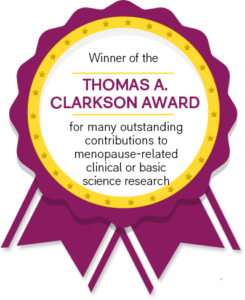Doctor Steven R. Goldstein MD is considered a top perimenopause specialist in New York and across the nation. He has extensive experience working with menopausal and perimenopausal women. He has authored two books on Perimenopause and Menopause, one of them titled “Could it be…..Perimenopause?”. A Certified Menopause Practitioner, Dr. Goldstein is also a Past President of the International Menopause Society and a past President of the North American Menopause Society (NAMS).
Before discussing the details of this stage of life, here’s an actual case of one of Dr Goldstein’s Perimenopausal patients on her first visit. Perimenopause is one of the most misdiagnosed conditions in women, and unfortunately there are many like this woman who are not diagnosed properly, until being seen by Dr Goldstein.
This forty-four-year-old woman began to realize that there were only about eight to ten days of every month when she felt good. On those days she was hopeful. Grounded. Optimistic. Peaceful.
The other days she was a roller coaster of swollen, sore breasts, jeans that wouldn’t zip, hunger that wouldn’t be assuaged. Add that to a dark, evil feeling of depression that mysteriously lifted its dead weight the day after she got her period. She couldn’t concentrate, her thoughts were always racing. She said she had PMS in the past and gotten a little cranky but nothing like this.
But then something strange happened one night. She was having dinner with a friend at a new restaurant. One minute they were talking and everything was fine. Then she started to feel strange, like she was eight feet above everyone in the room. Her pulse quickened; her heart pounded, she thought she had to get out of there NOW. They left the restaurant before the food came.
Her sister told her about hypoglycemia, she had a test, everything was fine. Her allergist told her that the pollen count had been high, and it makes people feel spacy. He said she should exercise indoors. Her internist shook his head and asked if there was anything going on at home. She was in a happy relationship for six years. He recommended Prozac, feeling that she was depressed.
It wasn’t the pollen count. It wasn’t her subconscious mind telling her she should get married. And she didn’t need Prozac.
After a thorough examination Dr Goldstein diagnosed her as “ogligo ovulatory” which means that she was only ovulating sporadically. Instead of Prozac she was given hormone replacement therapy (HRT) that functions like the hormone the body would produce normally when a woman ovulates. After two months, she never felt better. Her energy is high, concentration is back to where it was, and the attacks of anxiety have diminished.
Schedule a consultation with Dr Goldstein if you are feeling some of the same symptoms this woman did. Below is useful information for you to understand Perimenopause.
Perimenopause is the transition into menopause when a woman’s body begins to slow the production of hormones.
If you are a woman in your late thirties or forties and are experiencing irregular periods, occasional hot flashes, mood swings, free floating anxiety, memory lapses, inability to concentrate, and sleep disturbances to list a few, it is not all in your head and you are not alone. You may be experiencing perimenopause.
Thus, Perimenopause describes the changes that can occur in a woman long before actual menopause. It is not necessarily diagnosed with laboratory tests due to fluctuating hormonal levels which vary greatly from woman to woman.
As a Perimenopause Specialist in NYC, Dr. Goldstein has seen women visit internists, mental health professionals, neurologists, etc. for an answer to their symptoms only to find no answer until they wound up in his office for their exam.
Dr. Steven R. Goldstein, a perimenopause specialist with offices in New York City is the author of the medical textbook “Textbook of Perimenopausal Gynecology”. He evaluates women for the possibility of Perimenopause and further discusses the changes occurring in their bodies and what can be done about it on a case by case basis as each woman is different and individualized treatment works best.

Some of the symptoms of Perimenopause are:
During this perimenopause stage, “irregular” is what is considered normal in terms of menstrual periods. Shorter, longer, lighter, heavier, the character of a woman’s period can change so much during perimenopause, but sometimes this change can be subtle.


Yes, Perimenopause can cause irregular periods or spotting. This is because in Perimenopause, regular ovulation and cycles are less likely. When a woman doesn’t ovulate, no progesterone is produced.
Why does this matter? It does because cycles when women do not ovulate are characterized by variable amounts of estrogen production without progesterone to balance it. This “imbalance” isn’t dangerous (although it can be in the case of unopposed estrogen for very long periods of time, which is unusual), but it is the basis of a host of symptoms that appear to be totally unrelated to the woman’s menstrual cycle – occasional hot flashes, sleep problems, free floating anxiety, memory lapses and “foggy memory”, inability to concentrate, feeling depressed at times, worsening PMS, and so on.
Secondly, this condition of estrogen without progesterone to balance it (which occurs during Perimenopause) can result in these other symptoms as well such as Salt and Fluid retention, Low blood sugar levels, blood clotting, fibroid tumor enhancement, altered thyroid hormone function (leading to weight gain or feelings of exhaustion), increased production of body fat, feelings of sluggishness and low energy.
To be clear, the above symptoms can be due to many factors, but the fact that it can be due to Perimenopause and hormonal factors is unfortunately not considered as much as it should be.
You can read more about spotting and bleeding during perimonopause in this blog article by Dr Goldstein – Perimenopausal bleeding or Spotting.
Perimenopause is one of the least understood, most misdiagnosed, and most confounding stages in a woman’s life. It is essential to understand we are not talking about “early menopause”, which is why current books available on menopause don’t help and often confuse, depress or frighten younger women. Early menopause means that you stop menstruating completely for a period of at least twelve months, and that this occurs before the age of forty-five.
If you are a woman in your late thirties or forties and you are experiencing symptoms like those above you need to know that this is very likely not all in your head. There probably is something physical happening here. These symptoms may be related to destabilizing estrogen levels and a decrease in ovulation and you are entering into a stage known as Perimenopause, which begins about a decade before the onset of actual menopause.
Unlike menopause which can be strictly defined and proven with laboratory tests, perimenopause has more fluctuation and is actually defined as “irregularly irregular” hormone levels. The perimenopausal process is highly individualized , with great variation from woman to woman. Perimenopause is about a distinct stage with symptoms and realities of its own that responds to specialized health care strategies.
Dr. Goldstein, a top rated Perimenopause Specialist in New York, personally evaluates patients, takes patient histories and performs all tests and procedures himself. After evaluation, Dr. Goldstein will discuss the best possible alternatives and treatment for perimenopause symptoms.
Dr Goldstein uses Transvaginal Ultrasounds to examine the endometrium (lining of the uterus or womb). The uterine lining is a biomarker for what is going on with the ovaries and must be evaluated prior to any treatment for perimenopause, menopause or post menopause. It tells a story.
Dr. Goldstein will also discuss other treatment options with you to help you cope with the symptoms of Perimenopause.
If you are experiencing symptoms of perimenopause or concerned it has begun, then please click the “appointment request” button below to request an appointment with Dr. Goldstein.
appointment requestTHIS WEBSITE DOES NOT PROVIDE MEDICAL ADVICE
The information on this site (or blog or article) is not a substitute for in office medical advice, diagnosis or treatment. The information is provided for informational or educational purposes only